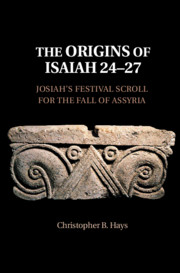Book contents
- The Origins of Isaiah 24–27
- The Origins of Isaiah 24–27
- Copyright page
- Dedication
- Epigraph
- Contents
- Acknowledgments
- Abbreviations
- Introduction
- 1 The Rhetoric of Chaos
- 2 The Royal and Divine Victory Banquet
- 3 Revivification of the Dead as National Deliverance
- 4 The Lofty City and the Army of the Height
- 5 Josiah and the Remains of Israel
- 6 The Language of Isaiah 24–27 in Light of Hebrew Diachrony
- 7 Stirring the Echoes
- Conclusion
- Book part
- Bibliography
- Index of Modern Authors
- Subject Index
- Ancient Text
1 - The Rhetoric of Chaos
Apocalyptic and Eschatological Interpretations of Isaiah 24–27
Published online by Cambridge University Press: 11 June 2019
- The Origins of Isaiah 24–27
- The Origins of Isaiah 24–27
- Copyright page
- Dedication
- Epigraph
- Contents
- Acknowledgments
- Abbreviations
- Introduction
- 1 The Rhetoric of Chaos
- 2 The Royal and Divine Victory Banquet
- 3 Revivification of the Dead as National Deliverance
- 4 The Lofty City and the Army of the Height
- 5 Josiah and the Remains of Israel
- 6 The Language of Isaiah 24–27 in Light of Hebrew Diachrony
- 7 Stirring the Echoes
- Conclusion
- Book part
- Bibliography
- Index of Modern Authors
- Subject Index
- Ancient Text
Summary
Isa 24–27 is lacking many of the generic components that characterize apocalypses, but early assessments of it as such have continued to exercise influence. Eschatological imagery of widespread destruction not only is shared with other early biblical texts such as Zephaniah and Amos but also is part of a widespread ANE tradition of divine destruction of the natural order. There is no reason to suppose that images of the divine disruption of the natural order are characteristic of a late period.
Such imagery of widespread disorder was commonly used as a precursor to the reimposition of order by a righteous king. In other words, the rhetoric of chaos was a form of royal propaganda arguing that a current ruler had brought about (or would bring about) the flourishing of his land, as he was supposed to do. As for why a supposedly royal, propagandistic text does not mention the king. It has pointed out that a similar text, the Potter’s Oracle, can be empirically shown to have started out as political propaganda and to have been stripped of its original historical context so that it came to appear apocalyptic in a similar way to Isa 24–27.
- Type
- Chapter
- Information
- The Origins of Isaiah 24–27Josiah's Festival Scroll for the Fall of Assyria, pp. 24 - 51Publisher: Cambridge University PressPrint publication year: 2019

